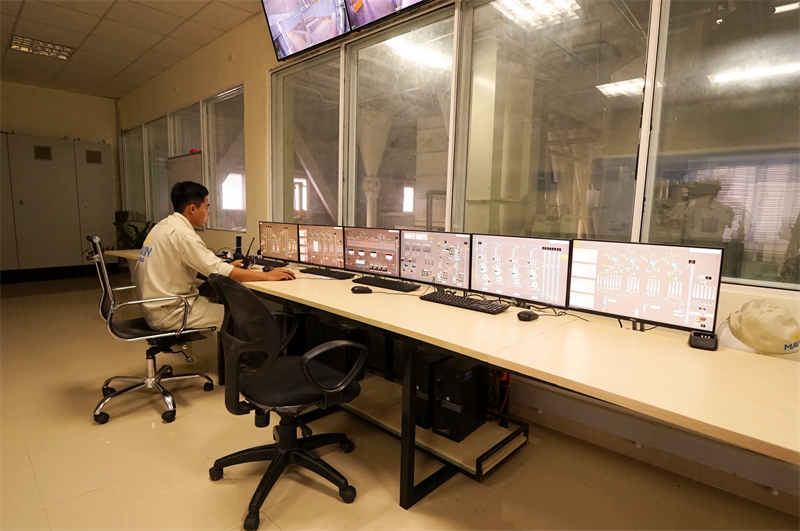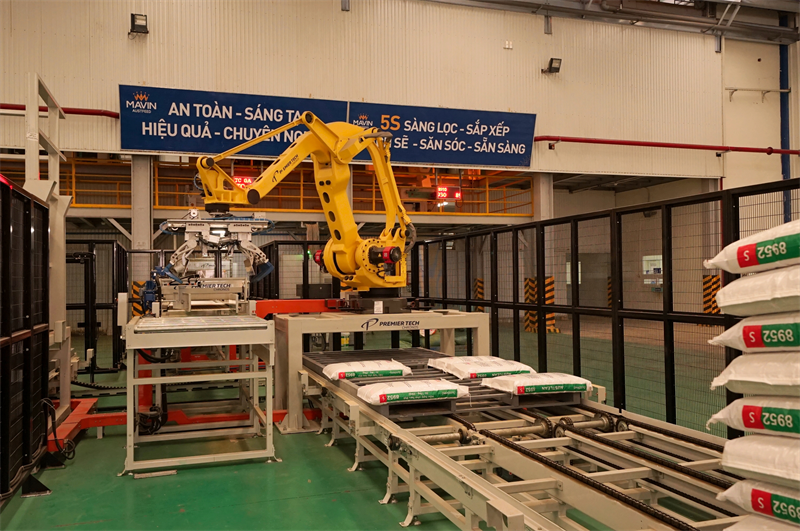Mavin Austfeed's latest feed mill in Dong Thap, South Vietnam, has a lot of advantages. Besides being designed to produce top-notch feed, it is located in a prime location that is close to many customers and export markets that can be served by both trucks and river barges.

The plant in Cai Tau Ha Industrial Complex, Chau Thanh District, Dong Thap province, about 140 km southwest of Ho Chi Minh City, has a total area of 50,000 sq m. It is accessible by both road networks and barges via the Mekong river. Having two options for shipping makes the Dong Thap plant logistically competitive because feed can be exported to Cambodia and Myanmar via the Mekong river.
Its wharf can accommodate 5,000-tonne ships and has a loading capacity of more than 300 tonnes/hour.
In the first phase, the plant produces 400,000 tonnes/year for domestic and overseas markets. In the second phase, due around 2022, production capacity will be increased further. Presently, it is using 30% of its designed capacity.
Dong Thap will serve as a one-stop hub in the south for broiler, layer and duck feed, as well as swine genetics, food products and veterinary drugs.
Operating processes
Truong Thanh Liem, plant manager, said the plant is GMP accredited. Its design and workflow is geared towards wholesome feed and efficient operations.
Raw materials are randomly tested for quality and nutrient profiles. Tested raw materials are stored in bunker and metal silos. The plant has total storage capacity of 30,000 tonnes. Additional metal silos with a stocking capacity of 9,000 tonnes are to be installed.
The plant has five, 20-25 tonnes/hour pellet mills, giving a total production capacity of 85 tonnes/hour. The pellet machines are automatically controlled and operators are needed only to set the pelleting temperature. The software adjusts other parameters to achieve optimal pelleting conditions. This minimizes rework and fines.
Shrink loss is below 0.2% and operating cost per kg is 300 VND. Its next challenge is to reduce the production cost to below 250 VND/kg by reducing fuel costs, rework and maintenance expenses, he said.
Piglet feed is made from full fat corn and full fat soybeans with a single-screw extruder that can produce five tonnes/hour.
Poultry pre-starter feed is presented in crumble form. After pelleting, the feed passes through crumble rolls to break it into smaller particles. The crumbled particles pass through a sieve to remove undersized particles and fines which are pelleted again.
Die hole sizes are 2.3, 3 and 4 mm. The compression ratio for poultry feed ranges from 11.7-15 and hog grower finisher 13-16. Average pellet hardness is 97-98%.
Hog grower/finisher feed is highly gelatinized by undergoing a conditioning temperature above 90C, retention time 65 seconds, steam pressure 2.5 bar. The gelatinization process also makes the pellets highly durable.
The mixer is large, with a batch size of five tonnes. Premixes are added manually. Ground grains, minor and major ingredients are stored in bins. Three macro ingredient scales operate simultaneously, each with a loading capacity of 500 kg.
Smaller scales are used for minor ingredients which weigh assigned ingredients independently within the mixer’s cycle time. The batching system is accurate and synchronized with mixing cycles.
Of the total production 70% is pellets, with the rest mash and crumble feed.
Procurement of process control system software for premixes is underway. The premix operation will be fully operable sometime in 2019, said Mr Liem.

A robot arm handles the 25-40 kg feed bags at a rate of 20 tonnes/hour. Installation of two more robot arms is to be completed in 2019.
Bulk trucks will be used to service its own farms in the near future in order to reduce the number of bags used.
Mavin Austfeed operates five feed mills in Hung Yen, Ha Nam, Nghe An, Binh Dinh and Dong Thap with combined capacity of over 1 million tons/year. It has invested in a Research and Development Center in Cao Lanh district, Dong Thap province to undertake nutritional, genetic and animal health research.
Source: Feed & Livestock Magazine